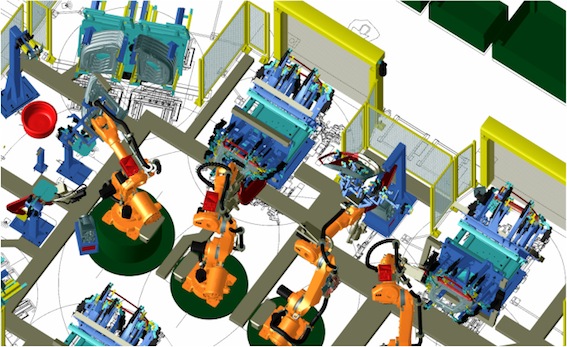How Manufacturing ERP Streamlines Manufacturing and Stock Control
Many small to medium-sized manufacturers, including startups, generally begin life simply with a combination of manual systems combined with one or several small platform software types working side by side.

You can also listen to this article:
The reason for this method of operation is usually financial, with the assumption being that the organization will grow and obtain a more consolidated system down the road.
However, it doesn’t take much growth at all for the level of complexity in running a manufacturing operation to exponentially increase. And when that happens, manual and labor-intensive systems can collide with the ever-increasing data making it almost impossible to manage efficiently.
Adding an ERP System
In the hyper-competitive world of manufacturing, having good company systems is crucial to success. And as growth brings additional business in the form of production orders, small to medium-sized manufacturers begin to look to address several issues impeding growth. These issues can include:
- Too much data overall, combined with disparate systems, overwhelms production and planning.
- The company realizes it needs increased automation to make processes more efficient.
- The amount of data in the growing operation makes the analysis of the data difficult and negatively impacts decision-making.
- Additional functionality is required as employees who had previously done combined jobs now must settle into specified, more traditional roles where functions are organized in a departmental structure.
When reaching this point, manufacturers begin to look at ERP systems to address these concerns. ERP systems can un-silo the data and consolidate operations and communications under a single platform to eliminate the need for multiple software platforms running side by side, and sometimes in opposition to one another.
ERP systems also allow automation, which frees employees to work more efficiently and managers to make sounder decisions across the board using real-time data. And they allow data to be standardized, opening the door for process improvement at all levels.
How an ERP System Streamlines Manufacturing
The overall purpose of a solid ERP system is to streamline business practices for all aspects of the business. For manufacturing, this streamlining can include:
- Centralized Data – When a company uses numerous systems to manage its operation, information, insight and analytical ability can be lost. As many of these systems capture and return data in different ways, there is often a messy, error-prone and manual step of “data rationalization” to make reporting consistent. With an ERP system, that data is centralized. This eliminates the need to reconcile the data and creates a single version of truth accessible to all departments as needed.
- Real-Time Automation – Real-time automated processes are more efficient and productive. This allows manufacturers to implement process standardization. By using the centralized data, and making it accessible to employees within the factory, processes can be improved that allow for a more efficient flow of material while reducing manual labor steps.
- Fewer Errors – With real-time automation, fewer errors are introduced into the workflow, resulting in a lower quality fallout rate. This is more cost-efficient and streamlines the manufacturing operation through reduced remakes, lower waste, and less material cost.
- Strategic Decision Making – Because data is standardized and shared, and because the operation is more efficient through automation, managers can spend more time analyzing data in real-time and less time “putting out fires”. The quality of the data, in conjunction with this improvement in productivity, sharpens decision-making to improve the agility and responsiveness to further improve manufacturing processes.
How an ERP Streamlines Stock Control
An ERP system can have as great an impact on stock control as it does on manufacturing. In companies without an ERP, inventory systems and supply chain, in general, can be messy, disorganized and its elements disconnected from one another. But by taking advantage of the same capabilities for streamlining as does manufacturing, supply chains and overall stock control can be integrated to improve cost and performance. That streamlining includes:
- Process Standardization – With common data available to all aspects of the supply chain, information and collaboration are available to all those managing and making decisions in the stock control workflow. Disparate and disjointed systems that exist from raw materials through inventory through shipping of final product can be joined with integrated data to allow more efficient utilization of stock. By using common data to develop standardized processes within the elements of the supply chain, data is accessible and usable to everyone. It allows a common format for the structure of procurement and stock to be developed seamlessly in a manner that fits each manufacturer’s unique business aspects.
- Tracking – An ERP system will allow tracking of stock levels throughout one plant or many. It can monitor output as well as orders, stock adjustments, and transfers. This data can be used to create more accurate forecasting and scheduling models that can utilize JIT production. Costs are reduced because the material is neither overordered which would trigger holding costs nor underordered which could trigger expensive expediting.
- Reporting – Because data is standardized and real-time, data can be visualized in a way that allows actionable decisions. As inventory levels shift, accurate trend reporting and analysis helps managers make critical decisions faster and at less cost.
- Shipping and Logistics – Because the elements of an ERP allows extensive automation and tracking, orders and units can be tracked from the point of receipt of materials, through manufacturing, storage and transport, and delivery. Cost, labor and time can also be tracked for this stage as well, allowing managers to understand the impact of shipping and logistics costs and to craft improvement plans.
- Inventory Control – As manufacturing operations grow, so does their complexity. An ERP system can streamline stock control to allow accurate inventory levels. Order of replenishment stock can be automated, min/max levels can be set with triggers for specific actions when stock levels get low, and product traceability and costing can also be used. Accurate and optimal inventory levels allow manufacturing to operate at peak performance while keeping costs low. Cash is not tied up in excess inventory and holding costs, nor is it spent through costly expediting of goods to cover shortages.
ERP systems streamline business operations through organization. And with ever-increasing complexity in today’s global manufacturing environment, companies need dependable and flexible ERP systems to help them compete. This is especially so for small to medium-sized manufacturers who need agile, customizable ERP systems tailored to their operational size and needs. Today’s ERP systems for these companies are affordable, flexible, cloud-based, scalable and are capable of consolidating manufacturing and stock control processes in an automated environment that gives each producer the best opportunity to succeed.
Find out which MRP/ERP software would be best for your business from our list of the Top Six Manufacturing ERP Systems for Small Manufacturers.



